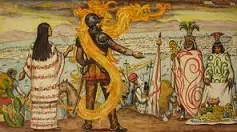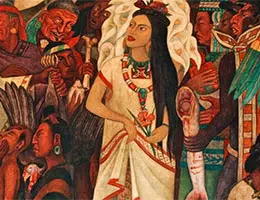 The term malinche comes from a Mexica slave who was the lover, advisor, and translator of the Spanish conquistador Hernán Cortés . La Malinche , in this way, had great importance in the European advance through Mexican territory .
The term malinche comes from a Mexica slave who was the lover, advisor, and translator of the Spanish conquistador Hernán Cortés . La Malinche , in this way, had great importance in the European advance through Mexican territory .
The way of evaluating La Malinche 's behavior and attitude changed over the years and has even led to conflicting positions. For some, this woman was a victim of colonialism when she was given as a slave. Others maintain that La Malinche was a traitor who harmed her people, while there are those who symbolically consider her as the mother of the mestizo culture that emerged from the fusion of the Spanish and the aboriginal settlers.
Other names by which Malinche is known are Doña Marina , Malintzin and Malinalli . The Mexica belong to the group of people called Nahuas , as well as others from Anáhuac, and they all shared the Nahuatl language . The exact site of his birth is not known, but it is estimated that it was in the current state of Veracruz, in the vicinity of the ancient Olmec capital called Coatzacoalcos . Regarding the date, it is likely to have been around the year 1500.
His family was from the upper class of the Mexicans, they were chiefs and lords of Copainalá , a town located in the area of the current municipality of Oluta. According to the research of historian Gómez de Orozco , his father was a chief and his mother belonged to the nobility, she was a lady with lands and vassals.
One of the names mentioned above, Malinalli, is the one Malinche is believed to have received at birth, in homage to the goddess of grass . Some time later they began to call her Tenepal , which can be translated as "someone who expresses himself with vivacity." His life became complicated after the death of his father and his mother's second marriage.
In 1519, Malinche was given to the Spanish as tribute along with nineteen other women by the aborigines of Tabasco, after the battle of Centla , where the Mayan-Chontals clashed with the conquistadors. Malinche's role in the conquest of Mexico was very important, both for his detractors and his defenders.
Her relationship with Hernán Cortés eventually led to them having a son, Martín Cortés , whom many consider the first mestizo . It should be noted that some historians believe that other children had already been born to couples between Aboriginals and Spaniards, so Martín would not be exactly the first. However, its relevance is unquestionable.
 The variations in the criteria that historians have used when studying Malinche's life have directly impacted her image over the centuries. This ambiguity is reflected in Mexican culture itself, and becomes even less clear when studied from outside.
The variations in the criteria that historians have used when studying Malinche's life have directly impacted her image over the centuries. This ambiguity is reflected in Mexican culture itself, and becomes even less clear when studied from outside.
In this context, different meanings of the word malinche appear, accepted as a common noun and as an adjective by the Royal Spanish Academy ( RAE ). The individual, entity or movement that commits betrayal is mentioned as malinche, in this framework.
Malinchista , meanwhile, is one who despises what is his own and, in return, values and admires what is foreign . This tendency, in turn, is called malinchism .
In its dictionary the RAE also includes another meaning of malinche. This is the name, in Nicaragua and Honduras , of a small tree , whose height does not exceed five meters, which bears fruit in a pod and has yellowish or reddish flowers. The bark of the malinche is used in tanning, while the leaves are used to make an infusion to which abortive properties are attributed.
